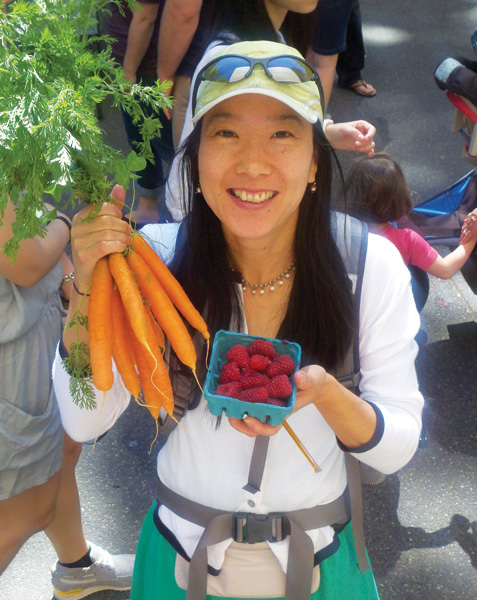Belle of the Chinese Banquet
“Food is a gateway to health and wellness, team-building, diversity—and who doesn’t love to eat?”

Six of us were hunched around a kitchen prep table while Natalie Keng ’90, founder of Atlanta-based culinary education company Chinese Southern Belle, coac hed us through the proper way to pleat Chinese Lunar New Year dumplings.
“Shape the dough into an S-curve,” she said, watching our fumbling fingers. “You only need two pleats per side; don’t get too fancy. Pinch toward the center so the dumpling ultimately curves into a crescent.”
She looked at our efforts and smiled. “Y’all have it easy with wonton wrappers. My mother and my aunts would stand in the kitchen for hours during the holidays, making everything from scratch. I’ll show you how to make dough in a minute—it’s like the difference in Italian cuisine between dried pasta and fresh pasta, maybe even more extreme.”
Moments earlier, Keng had demonstrated a simple, healthy stir-fry using the “three Gs” of Chinese cooking: ginger, garlic, and green onion. She showed us differences among Asian greens—pointing out, for example, the white stems of bok choi and the light green stalks of its close cousin, pak choi—while also encouraging us to swap in southern greens like collards or mustards. The group included a woman who had adopted a daughter from China, and another whose experience with Chinese cuisine didn’t extend past Kung Pao chicken.
The mix was typical for the myriad of events Keng hosts through Chinese Southern Belle, which she founded in 2009. Her mother, Margaret Keng, a former schoolteacher and accomplished cook, often joins her. Beyond hands-on classes and demos, they also organize themed dinners at restaurants or resorts and lead frequent tours through the many Walmart-sized Asian groceries that have sprung up around Atlanta’s metro area.
Keng’s Chinese-born parents arrived in Atlanta from Taiwan in the sixties. After graduating from Georgia Tech with an engineering degree, her father started one of the city’s first Chinese restaurant chains—in part to give immigrating family members a place to work. Keng and her sisters were the only Chinese children in her school. “I got called names,” she says, “but I was also special.
“When I arrived at Vassar for college, I thought, ‘Where did all these Asian kids come from? I’m not joining any of the Asian clubs.’” A restaurant review in the college newspaper changed her mind. The piece focused on a local Chinese carryout joint and drew on stereotypes—with references to laundrymen and dragon ladies. “The entrenched racism hit me,” she says. “I talked with the editor; reached out to Asian, Latino, and black organizations on campus; and crafted a group letter we published to say that we weren’t going to stand for this kind of insensitivity.”
Keng declared Asian Studies as her Vassar major and then earned a master’s degree from Harvard University in public policy. She served briefly as an elected official for the town of South Hadley in Massachusetts but ultimately decided against a political career.
“You have to have thick skin to be a politician,” Keng says. “I don’t. I have ginger-root skin.”
She instead focused on a career leading diversity trainings for corporations, a background that served her well when she began Chinese Southern Belle. “It’s fun to meet people with a whole range of food tastes and exposure to Asian cuisines.”
She chose the name of her company deliberately to encourage a light, approachable tone, and to diffuse the ironies that can sometimes arise in teaching Asian cuisines in the South.
“Pig ears are trendy in restaurants right now,” she says. “We grew up on those, and it looked like a pig ear when we ate it; it wasn’t cut up in strips and fried so deeply that no one can recognize it. Now hot Southern chefs can charge $20 a plate for them.”
Still, Keng feels that opening minds is her calling. “It seems like the world is coming into a multidisciplinary approach to cooking. Food is a gateway to health and wellness, team-building, diversity—and who doesn’t love to eat?”
Bill Addison is Atlanta magazine’s food editor and restaurant critic.
